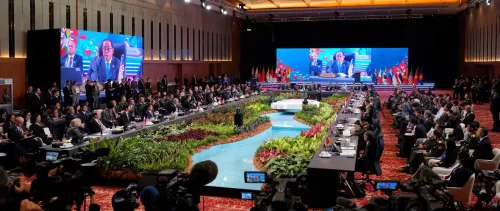
Digital skills are seen as key for companies across South-Eastern Asia, but many see significant gaps in these areas, according to the World Economic Forum’s Future of Jobs Report 2025. Image: Tom Fisk/Pexels
This article is part of:Centre for the New Economy and Society
- Digital skills are seen as key for companies across South-Eastern Asia, but many see significant gaps in these areas, according to the World Economic Forum’s Future of Jobs Report 2025.
- Geoeconomic fragmentation and climate change are also shaking up industries, creating a need for resilience and adaptability among workforces.
- Upskilling and reskilling are therefore goals across workforces and populations, and each country must find the most efficient and effective ways forward.
South-Eastern Asia has doubled its share of global goods exports over the past 30 years. It now accounts for around 8% of the market. But geoeconomic fragmentation and technological shifts are leading some to think the region may need different economic building blocks, and a restructuring of its jobs market.
A total of 41% of businesses in the region – far above the global average of 23% – believe restrictions on global trade and investment will have some of the biggest impacts on their operations in the next five years, as revealed in the World Economic Forum’s Future of Jobs Report 2025.
Yet trade in services is also growing – led by travel, transport and business services – and is less likely than goods trade to be dented by geopolitical tensions. For instance, as a finance hub, Singapore’s services trade makes up around 70% of its GDP, while the Philippines and Thailand are seeing rapid growth in their service economies.
Employers therefore see a shift in the skills they will need from employees over the next five years, but 60% worry that skills gaps will hamper them from preparing for the changing business landscape.
Have you read?
- The future of jobs in China: the rise of robotics and demographic decline are opening up skills gaps
- The future of jobs in India: employers seek to boost tech talent to drive AI and digital growth
- The future of jobs in Latin America and the Caribbean: digital skills gap must close quickly to satisfy evolving employer demands
Some of these skills will need to relate to climate-change adaptation, with almost three-quarters of businesses expecting climate mitigation efforts to transform their organizations by 2030. The region’s extensive coastlines, heavily populated low-lying areas and reliance on natural resources make it particularly vulnerable to climate change – which is also a threat to trade infrastructure and supply chains – so environmental stewardship skills are expected to be in high demand.
What does the future of work look like in South-Eastern Asia? One of transition. A total of 43% of employers expect today’s core skills to be disrupted by 2030, higher than the global average of 39%.
“Supplementing childcare to attract working parents, altering retirement ages, making hiring and firing practices more flexible, and adjusting immigration laws are all on the table to boost talent availability.”
This will reshape how employers and employees work. Employers estimate that 41% of tasks today are done predominantly by workers, with 27% delivered by technology. In 2030, technology is expected to account for 37% of tasks, with humans covering 31%, and the rest completed through human-machine collaboration.
However, the need to secure skilled talent remains. Supplementing childcare to attract working parents, altering retirement ages, making hiring and firing practices more flexible, and adjusting immigration laws are all on the table to boost talent availability.
Key labour-market trends in South-Eastern Asia
Digital developments are predicted to have some of the biggest impacts on businesses in the region by 2030. As well as rising adoption of AI, big data, and information processing technologies (predicted by 90% of employers), change will happen on a macro level through an expansion in overall digital access (foreseen by 72%).
However, some are concerned that inadequate data and technical infrastructure may hamper digitalization and other business transformations, with 55% in Viet Nam, 49% in the Philippines and 35% in Malaysia feeling this way – all above the global average of 32%.

Another factor looming large – and which may be linked to fears around trade barriers – is slower economic growth, with 69% of employers singling this out, far above the 42% who did so globally. This is most prominent in Thailand, with 73% expecting slower growth to impact their business by 2030. In Singapore, 64% of employers expect their business to be impacted by geoeconomic fragmentation, twice the global average.
How can employers respond?
Companies can only survive the digital upswing, geopolitical fragmentation and potential economic downturn if they build resilience and adaptability in their teams and operations. Globally, geoeconomic issues are driving demand for network and cybersecurity skills, as well as for human-centred skills such as resilience, flexibility, leadership and global citizenship. This shift combined with the rise of remote work is creating change in South-Eastern Asia, where employers expect strong growth in networks and cybersecurity skills (92%) and in resilience, flexibility and agility (83%) by 2030, higher than the respective global averages of 72% and 68%.

“South-Eastern Asia’s talent landscape is increasingly borderless, with skilled professionals – especially those in emerging and technical fields – moving freely across the region,” says Tieu Yen Trinh, founder and CEO of Talentnet Viet Nam. “This is heightening competition, compelling companies to act swiftly and strategically in upskilling and reskilling their key talents.”
Many are focusing these skilling strategies on moving employees from declining roles into growing ones in the next five years. A fifth of jobs in the region are expected to change in this period – AI specialists and sustainability specialists are seen leading the job growth, not least in Indonesia, which is partnering with the World Economic Forum to launch a Jobs and Skills Accelerator to strengthen public-private collaboration on labour market preparedness.
“This collaboration is focusing on skills development, especially in green jobs and digital transformation,” says Minister of National Development Planning Rachmat Pambudy. “It will provide opportunities and exposure for us to be involved in international forums where we can gain the latest knowledge and adopt global practices in job growth initiatives and skills training to ensure a just transition.”
To make these job changes a reality, 96% of employers see a need to invest in improving or adapting the capabilities of their existing workforce – above the global average of 85% – with a large number in Singapore and Thailand planning to take this route.
“Many employers in Singapore and Viet Nam, however, believe finding staff with the skills they need will only be possible with public policy reforms that improve training and education to expand the talent base.”
However, reskilling and upskilling need to be done quickly and smartly, with 62 out of every 100 workers in South-Eastern Asia expected to require training by 2030.
Alongside upskilling, hiring new staff who already have these emerging skills will be almost as prominent, with 86% of companies looking to do this, again outstripping the worldwide average of 70%.
- DISCOVER
What's the World Economic Forum doing about diversity, equity and inclusion?
The COVID-19 pandemic and recent social and political unrest have created a profound sense of urgency for companies to actively work to tackle inequity.
The Forum's work on Diversity, Equality, Inclusion and Social Justice is driven by the New Economy and Society Platform, which is focused on building prosperous, inclusive and just economies and societies. In addition to its work on economic growth, revival and transformation, work, wages and job creation, and education, skills and learning, the Platform takes an integrated and holistic approach to diversity, equity, inclusion and social justice, and aims to tackle exclusion, bias and discrimination related to race, gender, ability, sexual orientation and all other forms of human diversity.

The Platform produces data, standards and insights, such as the Global Gender Gap Report and the Diversity, Equity and Inclusion 4.0 Toolkit, and drives or supports action initiatives, such as Partnering for Racial Justice in Business, The Valuable 500 – Closing the Disability Inclusion Gap, Hardwiring Gender Parity in the Future of Work, Closing the Gender Gap Country Accelerators, the Partnership for Global LGBTI Equality, the Community of Chief Diversity and Inclusion Officers and the Global Future Council on Equity and Social Justice.
Many employers in Singapore and Viet Nam, however, believe finding staff with the skills they need will only be possible with public policy reforms that improve training and education to expand the talent base.
“Thailand is enhancing talent availability through strategic policies and expanded vocational training programmes, helping drive growth in high-tech sectors,” says Wilert Puriwat, President of Bangkok’s Chulalongkorn University. “Recent efforts also emphasize STEM education and digital literacy, with these targeted policy interventions reflecting Thailand’s urgent push to cultivate a future-ready labour force.”

What’s next for South-Eastern Asia?
Finding the most efficient and effective way to reskill staff – and wider populations – is the key question facing businesses and governments in South-Eastern Asia.
Companies in Malaysia are exploring distinct related approaches. Around a third (32%) expect their training to be co-funded across the industry, twice the global level. In addition, 35% (again more than twice the global average) plan to diversify skill assessments when hiring by looking at short courses and online certifications rather than just degrees.
In Viet Nam, increased public funding for reskilling and upskilling is seen as the best way forward by a majority of employers, alongside more flexible hiring and firing practices. Half of respondents think help to plug skills gaps can be found by changing immigration laws (versus 26% globally), while 46% think changing the retirement age could help (compared to 25% globally).

In Thailand, 64% of employers plan to use diversity, equity and inclusion programmes to help bridge skills gaps, while 45% are looking at supplementing childcare for staff. There is also a belief that the public sector should do more to fund reskilling and upskilling.
Preparing people for the jobs of tomorrow is a primary focus of the World Economic Forum’s Reskilling Revolution, which brings together businesses, governments and civil society to address the growing need to transform education, skills and learning to meet the demands of our rapidly changing world.


